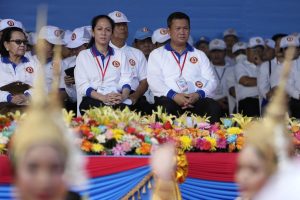In theory, national elections in Cambodia on July 23 present little risk of a surprise. Prime Minister Hun Sen’s Cambodian People’s Party (CPP), which has held power since 1979, is set to once again win all of the 125 seats in the National Assembly.
This would be the same result as the previous national election in 2018; the use of the same anti-democratic measures is likely to lead to the same outcome. In 2023, as in 2018, Hun Sen has taken steps to eliminate the main opposition party from the competition.
At the last election in which it was allowed to participate, the local elections of 2017, despite serious electoral manipulation in favor of the ruling CPP, the opposition won 44 percent of the vote. It would certainly have won these elections, and the national election the following year, had an honest counting process taken place. The Cambodia National Rescue Party (CNRP) could not contest the 2018 elections having been suddenly accused of “treason” and dissolved in November 2017. A few months later, without any competition, the CPP won every single seat in the National Assembly.
The Candlelight Party (CLP) is now the main opposition party. In May of this year, it was prevented from contesting the election by the use of a grotesque bureaucratic pretext. The authorities demanded an original registration document which they had seized from its headquarters during a police raid years before.
As in 2018, there will be no real opposition, which will ease Hun Sen’s task of handing over to his son Hun Manet following the coming vote. But a new element could disrupt or even block this well-rehearsed scenario.
The new element, which seems to have surprised Hun Sen, is the opposition’s call to voters who want a democratic change to refuse to vote for any of the 18 parties which are officially taking part. All of these parties are more or less aligned behind Hun Sen. The opposition is calling on its supporters to cancel their ballot with a single large cross covering the voting slip. Such a null and void vote will allow the voters to show their frustration at not being able to vote for the party of their choice.
A null vote for the democratic opposition will also express a rejection of an election process designed simply to maintain the CPP in power. The opposition will be able to show its continued strength in an indirect manner as the number and percentage of voters who mark their paper in this way will be published. At the same time, this act of expression at the ballot box will underline the aspiration of ordinary Cambodians to take part in real elections. Since the election organized by the United Nations in 1993, which saw Hun Sen defeated in a result that he overturned in a violent coup in 1997, Cambodians have turned out in huge numbers for every election in which even a semblance of a choice existed.
Collective Voice
It’s difficult for an opposition party to show its strength under a dictatorship. Protests, meetings, petitions, and strikes invite immediate crackdowns. The elections are rigged even when the opposition is allowed to stand. Ordinary people are afraid to express themselves for fear of reprisals from the authorities.
Null and void votes on July 23 give people a way to express themselves without taking risks. This political gesture is protected by the secrecy of the ballot. It’s a rare chance to express an opinion. The number of null and void votes will be the way to measure this.
Hun Sen has reacted to the opposition’s call for null and void ballots with an unusual silence. Opposition initiatives usually provoke government fury. He clearly does not know how to respond. The opposition called for a boycott in 2018. Hun Sen seems to be still in this mindset as he adopted measures in recent weeks against those who refuse to vote and call for boycotts. The opposition’s new tactics have rendered those measures useless.
Hun Sen can’t threaten people with null ballots even if he wanted to. First, he would have to identify them. Brutal and authoritarian as he is, Hun Sen is not yet so unreasonable as to get rid of the secret ballot. That would mean the loss of legitimacy the world over and the immediate end of his regime. The CPP wouldn’t let him do it, and the succession by his son Hun Manet would become impossible if he did.
Hun Sen’s hardest days are still ahead. He thought that the election on July 23 would be a plebiscite for his regime. Null and void voting has the potential to stand that on its head. Those who oppose his regime constitute the vast majority of Cambodia’s population. They now have the chance to speak with a single collective voice. The opportunity exists for them to deal a stinging rebuke to the dictatorial regime in place and the dictator himself.

































